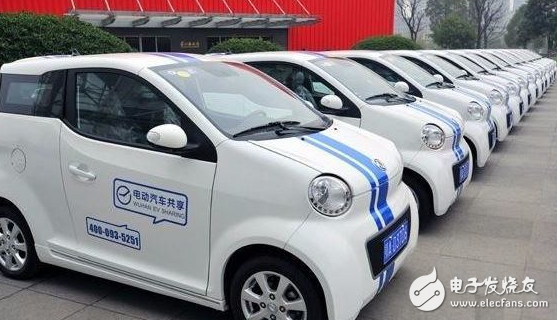Sharing a car is an innovative concept, but it still faces numerous challenges in implementation. Since shared cars are used by multiple people and have high usage frequency, incidents of rule violations by individual vehicles are common, and the number of such occurrences remains significant, causing disruptions in the traffic system. In addition to that, there are various other shortcomings. As a complement to urban public transportation, shared cars are gaining popularity in many cities across the country. However, industry insiders believe that the sector is still in its early stages, and sharing the "car market" is not an easy task. Not Very Convenient to Use Amid the growing trend of the sharing economy, can shared cars become as popular as shared bicycles? A reporter recently tried several new energy car-sharing platforms in Beijing. The process of renting a shared car is relatively straightforward and similar to that of shared bikes. First, you download the app on your phone, register using your mobile number, and upload photos of your ID and driver’s license. After a background check, you can start using the service. The basic steps include booking a car, unlocking it via the app, picking it up, returning it, charging it, and confirming the return. Most platforms charge based on a base rate plus per-kilometer fees, which includes traffic insurance, vehicle loss insurance, and commercial third-party liability insurance. Rentals can be hourly, daily, or even for overnight use. While the rental process is convenient, using a shared electric car isn’t always easy. One major issue is finding a return point and a charging station. When the reporter searched for a nearby return location near Xuanwumen, the closest one was 4 kilometers away. Currently, most shared cars in first-tier cities like Beijing are electric and must be parked at designated outlets with charging stations. This raises questions about how to handle vehicle restrictions, how to secure parking spaces in expensive urban areas, and how to manage charging infrastructure—issues that limit the expansion of service points and affect user experience. Fan Yongyue, deputy general manager of Beilu New Energy's Green Dog Car Rental, said that the shared car industry has taken time to reach where shared bikes are now. Three key factors are needed: the integration of cars, parking spaces, and charging piles; a dense network of service points for easy access; and off-site rental capabilities. Should Accept Necessary Market Regulation Issues like traffic violations, improper parking, fake personal information, payment problems, vehicle cleanliness, and appointment management have become real pain points for users and businesses alike. To address these issues, the Ministry of Transport and the Ministry of Housing and Urban-Rural Development jointly issued the “Guiding Opinions on Promoting the Healthy Development of Small and Minibus Leases.†Experts believe this document takes a forward-looking approach by combining a positive and negative list, helping regulate expectations and behaviors while guiding the industry toward a healthier state. For instance, the “Guiding Opinions†require strict verification of the lessee’s identity. As Professor Yan Dajian from Tongda University explained, unlike traditional taxis or ride-hailing services, shared cars have different legal requirements. In case of an accident, responsibility may fall on the lessee, so entry criteria for users must be strictly enforced. “Car-sharing provides travel options for consumers with special needs, helping to slow the rapid growth of private car ownership,†Yan said. The guidance also clarifies the role of shared cars in the city’s integrated transport system, promoting sustainable development of urban transportation. Industry experts suggest that shared car services should accept necessary market regulations, including aligning the total number of vehicles with demand, ensuring prices follow market rules, and distributing service points reasonably. Has Not Yet Seen Explosive Growth Compared to the highly concentrated stage of shared bike platforms, the shared car industry has not yet experienced explosive growth, and there is no national platform company yet. “The development of shared cars should proceed in an orderly manner. It won’t be as hot as some venture capitalists expect,†said Yan Dajian. An industry insider told reporters that currently, no car-sharing platform has achieved profitability. Most rely on the supply chain for survival, with some backed by car manufacturers and others offering value to upstream industries. Despite the promising vision of shared car services, what challenges do platform companies face? First, the cost of securing parking spaces is high, and pricing lacks effective oversight. In first-tier cities, the average cost of a parking space in the city center exceeds 800 yuan. Some parking lots have already been contracted, and some even raise prices for shared car companies, increasing their operating costs. Second, due to high usage frequency, shared cars often face more off-site violations. Fan Yongyue suggested linking the operation of vehicles to the lessees, shifting from “vehicle control†to “user management,†based on lease agreements. According to the Ministry of Transport, there are currently over 6,300 car rental companies in China, with around 200,000 rental vehicles. The industry is growing at a rate of about 20% annually. Over 90% of the companies have fewer than 50 vehicles, making it hard to scale operations and achieve economies of scale. Xu Kangming, chief expert on taxi reform at the Ministry of Transport, noted that the volume of shared car services at major transportation hubs like airports and train stations is still low. In big cities like Beijing and Shanghai, the number of shared cars is still in the thousands. There is huge potential for future growth—possibly ten or even a hundred times higher. The entire industry is still in its infancy. USB Sound module for toy,greeting cards,book There are the Sound module,mp3 sound module,USB Vocal module,Waterproof sound module,recordable sound chip etc for the musical greeting cards,postcards,paper bag,gift box,children toys etc USB Sound Module, MP3 Sound Chip, MP3 USB Sound Chip,USB Vocal module AST Industry Co.,LTD , https://www.astsoundchip.com